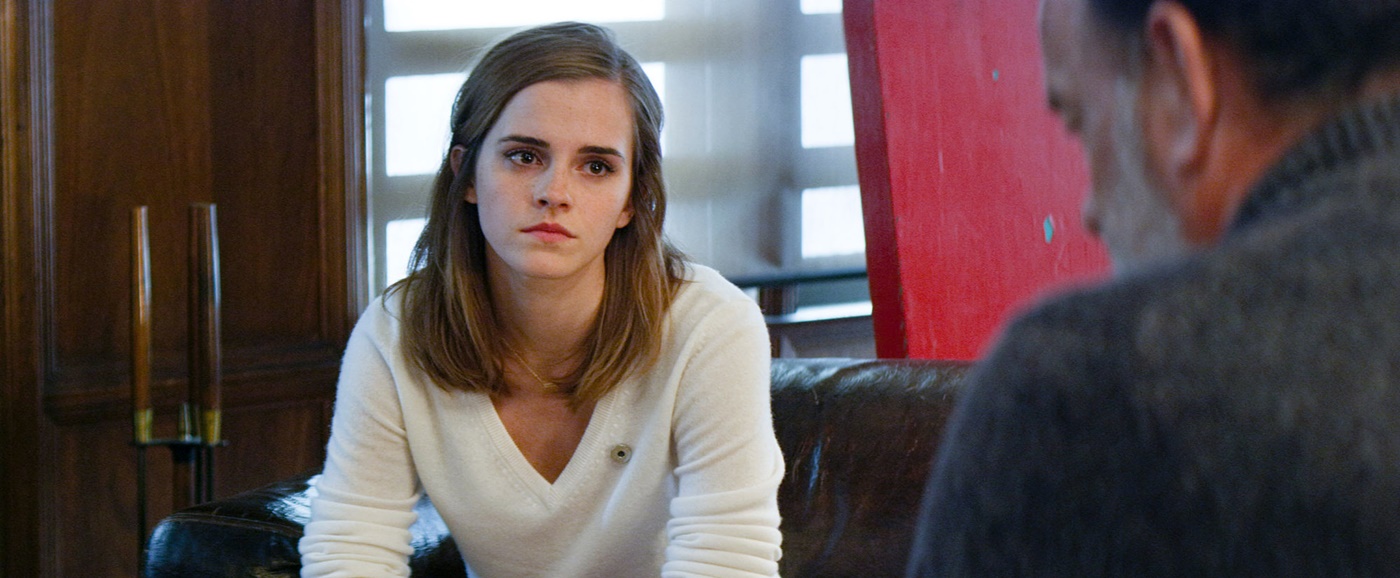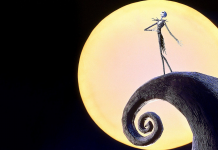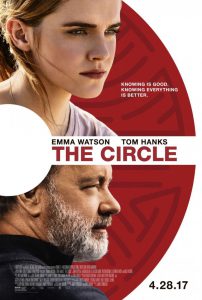 At the beginning of The Circle, Emma Watson‘s character is asked what she is most scared of. Her answer: “unfulfilled potential.” No two words could best describe The Circle – a film with a talented all-star cast, that includes the likes of Tom Hanks and the late Bill Paxton, and the timely debate of security at the loss of privacy and individuality through mass surveillance.
At the beginning of The Circle, Emma Watson‘s character is asked what she is most scared of. Her answer: “unfulfilled potential.” No two words could best describe The Circle – a film with a talented all-star cast, that includes the likes of Tom Hanks and the late Bill Paxton, and the timely debate of security at the loss of privacy and individuality through mass surveillance.
When Mae Holland (Watson) is accepted to an entry level position in the Circle (a fictional mash-up of Google and Facebook), it’s a dream come true. A company dedicated to placing all personal accounts under one umbrella (why deal with multiple passwords and accounts when you can opt for one simple unifying track?), the Circle and its surrounding campus is a sleek, technological wonder house – a hodgepodge of Google, Disneyland, and Jonestown. At the center of this tech utopia is Tom Hanks, himself a cross between Steve Jobs, Walt Disney, and a subdued TV preacher. His social media empire doesn’t succumb to the harsh unpleasantness of “thumbs ups” or “thumbs downs”; rather, there are smiley faces and sad faces. Soon, Mae becomes a true believer and accepts a role as the face of the company’s latest breakthrough, True You, a program which places her entire life online via a small wearable camera. What could possibly go wrong?
The Circle gratifies itself with a pat on the back as if it’s presenting the conflicts of privacy vs. transparency in an intelligent manner – “knowing is good, knowing everything is better” and “secrets are lies” being the mantras/marketing phrases that Hanks perpetuates. The question of whether or not we behave better when we’re being watched is a question worth exploring despite its terrifying implications. Do you want to live in a supposedly peaceful world at the cost of your individuality and free expression? If you allegedly have nothing to hide, then is there really a risk in being monitored 100% of the time (this, of course, being the supposed “debate crusher” when such allusions are made in the real world). What are the dangers when your opinions, habits, or profession fall outside certain accepted narratives, leaving you vulnerable to public outcry, demonization, and paralyzing scrutiny on an international scale?
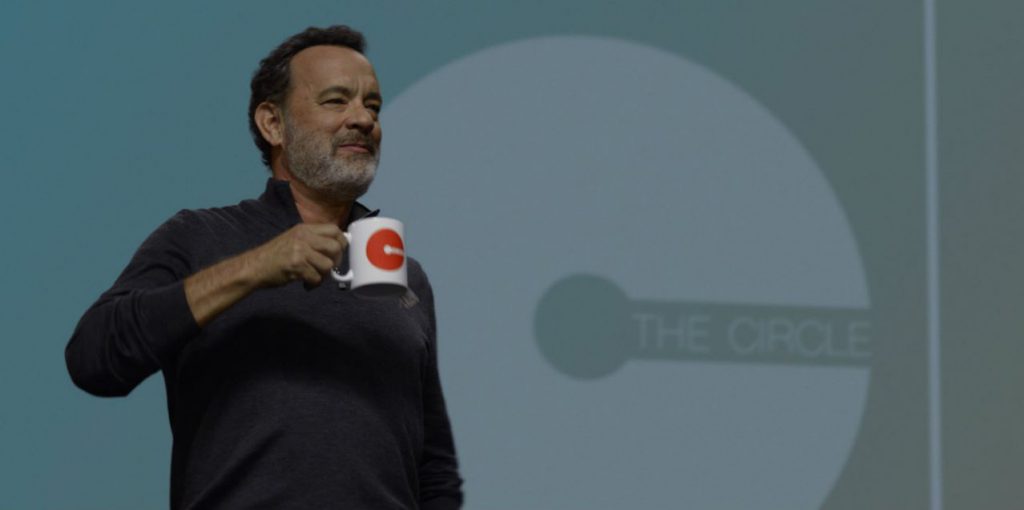
These are all questions that don’t necessarily require the added layers of fantasy that The Circle creates to tell its story – the real world threats are already here and now – but the lengths the film takes to hammer its overstuffed messages home brink beyond the unbelievable leaving the viewer feeling patronized in its infantile delivery. Whenever the film explores the possible public castration of such overwhelming hubris, it is done in a clumsy, predictable manner as to undercut the true menace presented (particularly, one major turn at the end of the second act).
It doesn’t help that the characters are severely underdeveloped and bland. Patton Oswalt is completely wasted as the conniving right hand man to Hanks. John Boyega‘s presence (despite his prominent billing) is essentially a glorified cameo that primarily involves him popping up here and there with an alarmed expression on his face. His only stand-out scene is one of exposition when he, for oddly asinine reasons, takes Watson under his wing before her ascension to the spotlight. Truthfully, he’s only there for an easy out later on. Hanks, despite his effortless charisma, is there to speechify – he’s not a character, he’s a stand-in for the oligarchy (an attribution that the film suggests but never effectively plays with). Similarly, Boyhood‘s Ellar Coltrane, the supposed voice of reason in the film, is there solely for foreseeable melodrama. We are often told that he is Watson’s closest friend – a revelation that I guess I should be thankful for because no one would have ever guessed by their practically creepy chemistry. A shame because the subplot where he is globally rebuked for his artistic expression could have been a far more intriguing and focused subject (not to mention well-timed) for a film on its own.
Fairing a little better is the naturally adorable Karen Gillan. Although her role in the film is painfully obvious from the onset (and comically taken over-the-top later on), she displays bits of energy that the film sorely lacks from the majority of its players. Bizarrely, the most compelling characters in the film are Watson’s supportive parents played by Glenne Headly and Bill Paxton. They’re the only characters given enough screen-time to interact with Watson on a more genuine level. We identify with their plight and connect with their hopeful but quietly cynical views on the events that transpire. Generally, they’re the most human characters in a film – an odd point, given the cardboard quality of the main players gambling with the fate of humanity. [As a side note, I will admit that it was tough watching the ever-reliable Paxton playing a debilitated character suffering from MS given his recent passing.]
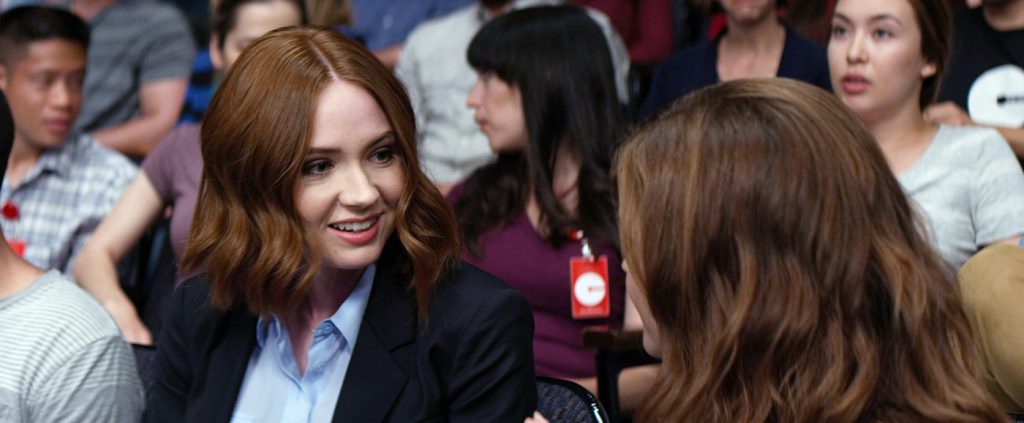
One of The Circle‘s biggest failings is the handling of Emma Watson’s role in the film. Is she the audience stand-in, the anti-hero, the innocent in the valley of fear, or the metaphorical corrupted idealist? The film itself doesn’t know, playing as many angles at once in the hopes that one latches on. For the most part, she is so passively accepting of the mania around her that when she does break down or stand up (or go on psychotic foggy midnight kayak adventures), it feels more scripted and forced than compelling.
Heck, near the beginning when she is confronted by a duo of community guides admonishing her for her lack of social media presence, the guides are presented in such an exaggerated, zany manner that I thought I was watching a scene straight out of the Owen Wilson/Vince Vaughn comedy, The Internship (2013); or, to go in another direction, any movie spoof involving a cult ever made. Not only is it jarring in tone (a fault much of the film suffers from), but her reaction is distractingly underplayed for a normal person – especially when soon after she is told that she has ingested The Circle‘s version of James Bond‘s “smart blood” from SPECTRE in which all her movements and health vitals are uploaded instantly to the higher ups. She literally takes this revelation sitting down.

Overall, the most compelling version of The Circle unfortunately is reality. Are the supposed grand outcomes of surveillance worth the price despite the reputed good intentions? Unlike Watson’s initial reactions in the film, I doubt that many would take such news sitting down (that being said, perhaps that’s the optimist in me). At the end of the day, the fear of unfulfilled potential is a genuine one – one that indeed brings us full circle.














